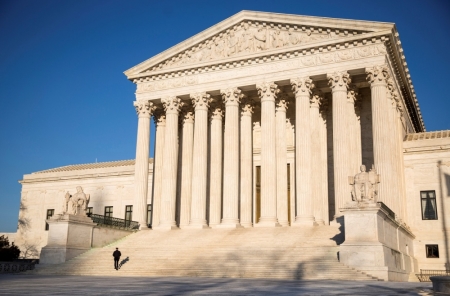Should Two Supreme Court Justices Who Officiated Gay Weddings Recuse Themselves From Same-Sex Marriage Case?

Two Supreme Court justices who officiated gay weddings don't need to recuse themselves from an upcoming case where they'll be ruling on the legality of state level gay marriage bans, despite demands from social conservative groups that they "disqualify" themselves, according to legal experts.
In April, the Supreme Court will hear arguments in an appeal from the Sixth Circuit regarding the constitutionality of state constitutional bans on same-sex marriage.
Calls have been made by some conservative groups for Justices Elena Kagan and Ruth Bader Ginsburg to recuse themselves from the case because they've officiated gay weddings.
Kermit Roosevelt, a law professor at the University of Pennsylvania Law School, told The Christian Post that neither justice needs to recuse themselves.
"I think it is easy, pretty easy, to predict how Justices Kagan and Ginsburg will vote. But that doesn't mean they should disqualify themselves," Roosevelt said.

"It's also pretty easy to predict how Justice Scalia will vote. There's a widespread misperception that it's somehow improper for justices to have opinions about legal issues — whether there's a national right to same-sex marriage, whether there's a right to abortion, whether Congress can require people to buy health insurance — before they hear cases about those issues."
Roosevelt continued: "We select justices because they are legal experts; of course they will have opinions on those issues. We can ask them to keep an open mind, but we can't ask them to have an empty head, and we wouldn't want them to, either."
"It's wrong for judges to prejudge factual questions before hearing evidence, but they should have pre-existing opinions about legal issues."
Over the past couple months some social conservative groups have called upon Ginsburg and Kagan to disqualify themselves from the upcoming state marriage amendment case.
The National Organization for Marriage has launched a petition asserting their belief that recent comments made by Ginsburg reveal a bias on the issue that warrants her recusal.
"A justice of any level — let alone one of the nine sitting members of the nation's highest court — must unquestionably remain impartial in regards to any matter before the court. Justice Ginsburg recognized this fact and invoked it frequently in her own confirmation hearings in 1993," reads the NOM petition.
"In light of these recent and deeply disturbing actions foreshadowing her intended ruling, I am demanding that Justice Ginsburg follow the law and judicial ethics, and disqualify herself from hearing the case pending before the court relating to same-sex 'marriage.'"
The American Family Association and the Coalition of African-American Pastors have also called upon Kagan and Ginsburg to recuse themselves.
Kara Loewentheil, director of the Public Rights/Private Conscience Project at Columbia Law School, told CP that "it is fairly common for Supreme Court justices to recuse themselves."
"The justices recuse themselves most commonly when they have a financial stake in the litigation or issues closely associated with the litigation, when they have close relatives who are parties or lawyers involved in the case," Loewentheil explained.
"… Or when they were involved with earlier stages of the litigation or the development of the law in question as a private party or government employee before they were appointed to the bench. The justices may also recuse themselves for other reasons, but they are not required to disclose those reasons to the public."
Regarding the calls for Kagan and Ginsburg to recuse themselves, Loewentheil replied that there "is no reason for Kagan or Ginsburg to recuse themselves from the case regarding state-level gay marriage bans."
"The justices in question performed an act, at the request of a third-party, which was lawful in the state where and when it was performed," Loewentheil said.
"They have no financial interest or other inappropriate stake in the outcome in the case, and have no obligation to recuse themselves."






















